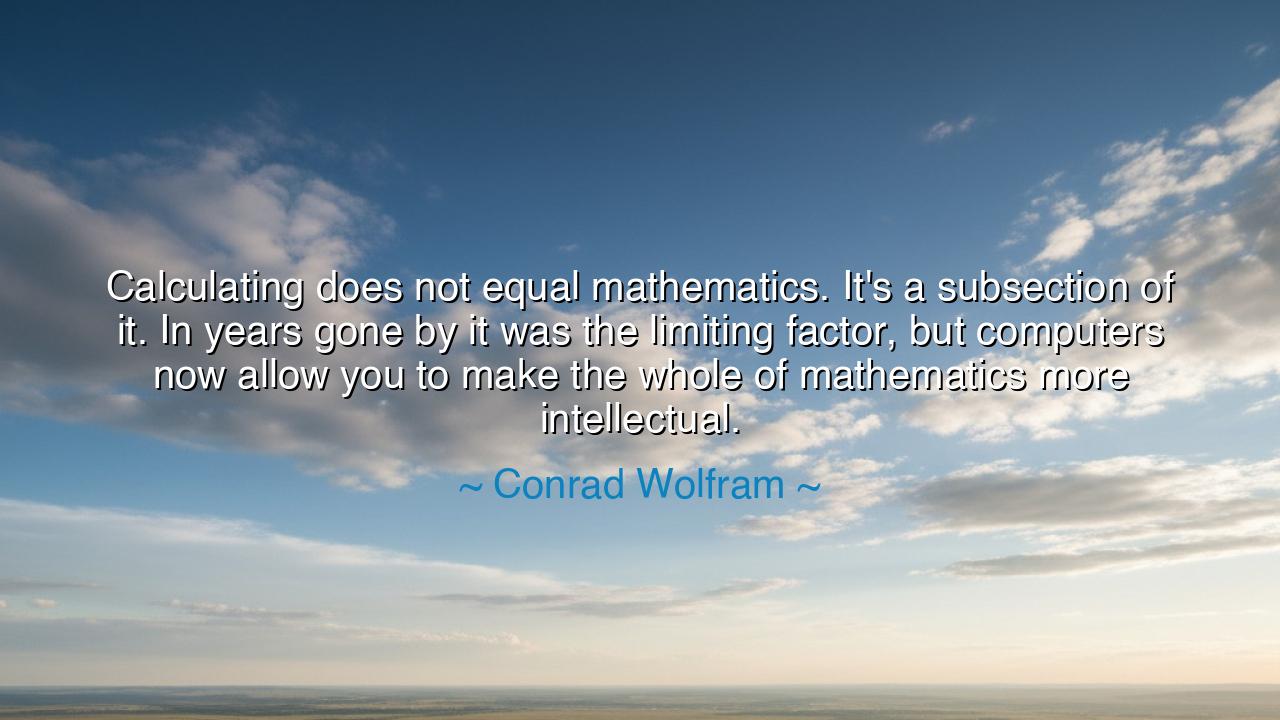
Calculating does not equal mathematics. It's a subsection of it.
Calculating does not equal mathematics. It's a subsection of it. In years gone by it was the limiting factor, but computers now allow you to make the whole of mathematics more intellectual.






In the vast expanse of human understanding, few domains have been as revered as the pursuit of mathematics—the very language of the cosmos, the key to unraveling the mysteries of the universe. Yet, as Conrad Wolfram insightfully notes, "Calculating does not equal mathematics. It's a subsection of it. In years gone by it was the limiting factor, but computers now allow you to make the whole of mathematics more intellectual." These words illuminate a profound shift in the way we engage with mathematics and the tools we use to comprehend the universe. Calculation, once the cornerstone of mathematical endeavor, is now but a humble servant to the more intellectual and abstract realms of mathematical thought, realms now unlocked by the power of computers.
The great minds of antiquity, such as Pythagoras, Euclid, and Archimedes, approached mathematics not as a tool for solving basic calculations but as a philosophy of structure and beauty. For them, mathematics was an art form—a means of contemplating the order of the universe. They sought not only to solve problems but to understand the very principles that governed all things. Yet, in their time, the act of calculation was slow, cumbersome, and often the limiting factor in their mathematical explorations. Calculators, whether they were the early abacuses or the complex geometrical methods of Archimedes, could only take them so far, and their visions of a more advanced mathematical understanding were hindered by the tools of their time.
Consider the ancient Egyptians, who, in their pursuit of understanding the world around them, used mathematics to build the great pyramids. Their knowledge of geometry and measurement was profound, yet their tools were far simpler than what we wield today. While they could calculate the measurements necessary to construct awe-inspiring structures, they were still bound by the limits of their tools. Wolfram’s insight speaks to this eternal tension—the tension between the tools we have and the higher intellectual pursuits we aim to achieve. The Egyptians’ mathematical genius was constrained by their instruments, just as early mathematicians were constrained by the need for manual calculation. But as technology has advanced, the barriers to deeper intellectual pursuits have dissolved, allowing us to transcend the limitations that once held us back.
The rise of computers has brought forth a revolution in mathematical thinking. Where once calculation was the very foundation upon which all mathematical work was built, computers now allow mathematicians to focus on the intellectual challenges of the field—theorems, proofs, and abstract concepts that were previously impossible to explore due to the exhaustive labor of manual calculation. The computer acts not as a mere tool for computation but as a partner in the intellectual endeavor, freeing the mind to soar to new heights of understanding. Wolfram highlights this shift from the mechanical to the conceptual, from the mind-numbing work of calculation to the pursuit of deep, creative thought that defines the essence of mathematics.
Consider, too, the story of Isaac Newton, whose genius in physics and mathematics changed the course of history. Newton’s work, especially in his Calculus, laid the foundation for much of modern science. Yet, his calculations were so complex and labor-intensive that they could only be fully realized after his death, when the technology of computation had caught up with his intellectual vision. Newton, like the great mathematicians before him, was bound by the tools of his era. If he had access to the computational power of today’s machines, his discoveries might have been realized even more quickly, and the scope of his work might have expanded further.
Yet, the rise of computers and the shift from calculation to intellectual engagement brings with it a new challenge. While we are no longer bound by the labor of manual computation, we must now grapple with the ethics and implications of these powerful tools. Just as Pythagoras and Euclid sought to balance their intellectual pursuits with the moral responsibility of their teachings, so too must we ensure that our use of technology is guided by wisdom, not just efficiency. The tools of today, as powerful as they are, must not overshadow the principles that guide our intellectual endeavors. The rise of artificial intelligence and advanced algorithms must be tempered by a commitment to truth, ethics, and humanity.
Wolfram’s words, then, offer a powerful lesson for us all. The power of computers has indeed transformed the landscape of mathematics, opening up realms of intellectual inquiry that were once beyond reach. Yet, with this power comes a responsibility—not to merely use these tools for calculation, but to push the boundaries of thought, to seek new understandings, and to use our technological advances to elevate the human spirit. We must embrace the future of mathematics not as a replacement for human thought, but as a means to enhance our ability to explore the deepest questions of existence. Let us use the power of these tools wisely, for they are not merely to compute but to inspire, to challenge, and to help us uncover the infinite truths of the universe.






AAdministratorAdministrator
Welcome, honored guests. Please leave a comment, we will respond soon